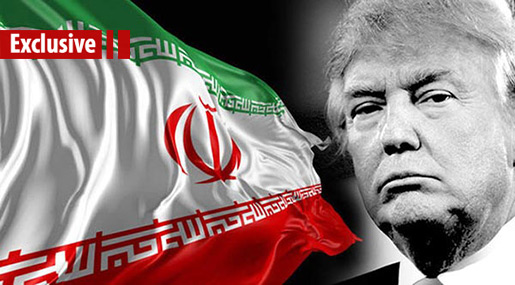
Iran’s Geopolitics & the Eurasian Strategic Triangle

Darko Lazar
In July, the US slapped Iran with fresh sanctions, warning that Washington would "not tolerate Iran's provocative and destabilizing behavior".

Meanwhile, the US State Department accused Tehran of continuing "its terrorist-related activity in 2016, including support for Hizballah... and various groups in Syria, Iraq and throughout the Middle East."
Ironically, it is precisely this prevalent support from the Iranians for both the governments in Baghdad and Damascus that brought the Daesh terror group - an offspring of US foreign policy - to its knees, facing imminent defeat.
So, in response to the latest package of sanctions, Tehran introduced new legislation that denies visas to American military and intelligence personnel and freezes their bank accounts.
According to the managing editor at Veterans Today, Jim W. Dean, "this is the first time that someone has officially sanctioned US entities for direct support for terrorism in the Mideast".
The Americans created Daesh
Over the last few years, the US, which is allied with the world's two most extreme ideologies - Zionism and Wahhabism - stepped up efforts to suppress Iranian influence across the Middle East at all costs.
Although it has long been understood that the arming of militant groups inside Syria by Washington and its allies facilitated the rapid rise of Daesh, a local Bulgarian journalist recently revealed, in some detail, the scope and size of the covert operation.
Dilyana Gaytandzhieva apparently did such a good job in exposing the weapons shipments to terror groups that she was fired from her paper and questioned by Bulgarian security services after the story gained traction.
Citing dozens of secret memos that she obtained through an anonymous source, Gaytandzhieva paints a vivid picture of how weapons were flown to Syria via diplomatic flights originating in the Caucuses and Eastern Europe, under the watchful eye of the CIA and other intelligence agencies.
Earlier this summer, the leader of the Islamic Revolution in Iran, Ayatollah Sayyed Ali Khamenei, called Washington's fight against Daesh "a lie".
"You [the United States] and your agents are the source of instability in the Middle East," Sayyed Khamenei said in June. "Who created Daesh? America... America's claim of fighting against Daesh is a lie".
The former US Secretary of State Henry Kissinger, who also happens to be an advisor to the current American President Donald Trump, recently offered some insight into the motives behind such policies.
"If the ISIS territory is occupied by Iran's Revolutionary Guards or Shia forces trained and directed by it, the result could be a territorial belt reaching from Tehran to Beirut, which could mark the emergence of an Iranian radical empire," Kissinger wrote in an article for CAPX.
Although Kissinger's choice of words is meant to be misleading, his stated concerns about the expansion of Iranian influence are well founded. The defeat of Daesh in Iraq and Syria brought about by Iranian involvement also marks the failure of the US-led ‘Greater Middle East' project.
In his book, America's War For The Greater Middle East, Andrew Bacevich explains that the region has been the theatre for a series of conflicts dating back to 1980, which heralded the start of the Iran-Iraq war. Since then, Washington has been involved in balancing conflicts amongst the region's culturally interconnected nations in order to further its interests.
Kissinger's claims are essentially a blatant admission that the biggest threat to these interests is the Iranian-led Shiite Crescent, consisting of Lebanon's Hezbollah, Syria, Iraq as well as Yemen's Houthi Ansarullah movement.
The Revolution of the bare-handed
In the winter of 1979, French philosopher Michel Foucault described the birth of the Islamic Republic as "perhaps the first great insurrection against global systems, the form of revolt that is the most novel and the most insane."
Foucault, who was in Tehran during the Iranian Revolution, wrote that the situation "can be understood as a great joust under traditional emblems, those of the king and the saint, the armed ruler and the destitute exile, the despot faced with the man who stands up bare-handed and is acclaimed by a people."
Nearly forty years later, Iran is a regional powerhouse and the only country in the Middle East with a truly independent and stable political system.
The Iranian revolt gave birth to a confident, technologically advanced nation, and one that has continuously proven to be the only real stumbling block to US regional hegemony.
And in what represents a nightmare scenario for Washington and its agenda, Iran's role in today's world cannot be defined solely in the context of the Shiite Crescent. Iran is no longer a leading power just in the Middle East, but in Central Asia as well.
The strategic Eurasian triangle
In recent years, the global order has been transformed from a unipolar one to a multipolar one. Iran has been one of the key protagonists in this transformation. The other two are China and Russia.
Through converging geopolitical interests, these three Eurasian powers have formed a strategic triangle. The objective is the stabilization and consolidation of the Eurasian heartland.
Initiated by Russian efforts to reintegrate former Soviet republics into its orbit, the Eurasian union was expanded by China's ‘One Belt One Road' initiative, gaining a unique global role in the 21st century.
The envious degree of cooperation between Tehran, Moscow and Beijing is characterized by its well-thought-out anti-western strategy, which is gradually suppressing American influence in the region.
Washington's opposition to these efforts is manifested through its support for terrorism, namely Daesh and Al Qaeda, as well as the inciting of wars in Syria, Iraq, Afghanistan and Yemen.
The Americans have good reason to be worried. The integration of the Eurasian landmass will have far-reaching repercussions for US geostrategic interests. And whatever remains of the western empire will be better served cooperating with the Eurasian union rather than trying to oppose it.
Source: Al-Ahed News



